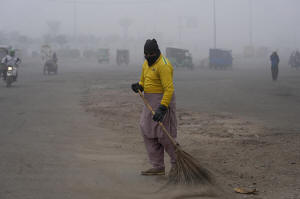Majority of the world's population breathes dirty air, report says
[March 11, 2025]
By SIBI ARASU
BENGALURU, India (AP) — Most of the world has dirty air, with just 17%
of cities globally meeting air pollution guidelines, a report Tuesday
found.
Switzerland-based air quality monitoring database IQAir analyzed data
from 40,000 air quality monitoring stations in 138 countries and found
that Chad, Congo, Bangladesh, Pakistan and India had the dirtiest air.
India had six of the nine most polluted cities with the industrial town
of Byrnihat in northeastern India the worst.
Experts said the real amount of air pollution might be far greater as
many parts of the world lack the monitoring needed for more accurate
data. In Africa, for example, there is only one monitoring station for
every 3.7 million people.
More air quality monitors are being set up to counter the issue, the
report said. This year, report authors were able to incorporate data
from 8,954 new locations and around a thousand new monitors as a result
of efforts to better monitor air pollution.
But last week, data monitoring for air pollution was dealt a blow when
the U.S. State Department announced it would no longer make public its
data from its embassies and consulates around the world.
Breathing in polluted air over a long period of time can cause
respiratory illness, Alzheimer’s disease and cancer, said Fatimah Ahamad,
chief scientist and air pollution expert at Malaysia-based Sunway Centre
for Planetary Health. The World Health Organization estimates that air
pollution kills around 7 million people each year.
Ahamad said much more needs to be done to cut air pollution levels. The
WHO had earlier found that 99% of the world’s population lives in places
that do not meet recommended air quality levels.

[to top of second column]
|

A sweeper cleans as smog envelops the area and reduces visibility in
Lahore, Pakistan, Jan. 11, 2024. (AP Photo/K.M. Chaudary, File)
 “If you have bad water, no water,
you can tell people to wait for half an hour a day, the water will
come. But if you have bad air, you cannot tell people to pause
breathing,” she said.
Several cities like Beijing, Seoul, South Korea, and Rybnik in
Poland have successfully improved their air quality through stricter
regulations on pollution from vehicles, power plants and industry.
They've also promoted cleaner energy and invested in public
transportation.
Another notable effort to curb severe air pollution was the
Association of Southeast Asian Nations agreement on transboundary
haze pollution. Even though its had limited success so far, ten
countries in the region pledged to work together to monitor and curb
pollution from large forest fires, a common occurrence in the region
during dry seasons.
Shweta Narayan, a campaign lead at the Global Climate and Health
Alliance, said many of the regions witnessing the worst air
pollution are also places where planet-heating gases are released
extensively through the burning of coal, oil and gas. Slashing
planet-warming emissions to slow the heating up of the planet can
also improve air quality, she said.
Air pollution and climate crisis “are two sides of the same coin,”
she said.
All contents © copyright 2025 Associated Press. All rights reserved |